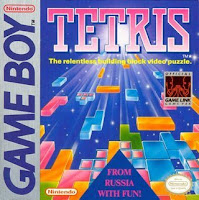 Since I've found it so hard to really have a discussion about Tetris, Tetris being best described as being Tetris and all, I could instead use it as a jumping off point to examining the types of play present in video games. On the subject of Tetris itself, from a historical perspective this is easily one of the most significant titles ever, doing a great deal to bust videogames out of the 'for kids' mold they had been cast in thanks to its popularity amongst the business crowd as well as pretty much single-handedly launching the Game Boy hardware to its lofty sucess. There isn't much to say about Tetris (again, the reason I'm going to soon go well off-topic) but I will say my complaints with it stem from the fact that there just isn't quite enough to do here.
Since I've found it so hard to really have a discussion about Tetris, Tetris being best described as being Tetris and all, I could instead use it as a jumping off point to examining the types of play present in video games. On the subject of Tetris itself, from a historical perspective this is easily one of the most significant titles ever, doing a great deal to bust videogames out of the 'for kids' mold they had been cast in thanks to its popularity amongst the business crowd as well as pretty much single-handedly launching the Game Boy hardware to its lofty sucess. There isn't much to say about Tetris (again, the reason I'm going to soon go well off-topic) but I will say my complaints with it stem from the fact that there just isn't quite enough to do here.I'm not a high-score hound, so for me my enthusiasm is tempered by the fact that every game ends in utter defeat and failure - preceded by a good period of time when the game has become so frantic as to cease being entertaining. Meanwhile, something like Tetris DS manages to present a bevy of very fun side-modes to shake things up in addition to providing some good tweaks that make the regular game more playable. It also sports AI opponents, meaning the (excellent) versus modes are always available, rather than only when one has a friend and a link cable. In short - Tetris shines most as a competitive title, and the competitive mode here is a pain to get going.
Tetris
Publisher: Nintendo
Developer: Bullet-Proof Software
Released: August 1989
Obtained: Roughly Easter 1991 (Gift)
Publisher: Nintendo
Developer: Bullet-Proof Software
Released: August 1989
Obtained: Roughly Easter 1991 (Gift)
8.0/10
Now, to pad this out a bit (and since it was Tetris that got me thinking along this route) I'm going to veer into a tangent on some ideas I've had regarding gameplay paradigms, which I break into three major categories (with signifigant overlaps, of course).
Playground games, where gameplay exists as a means of playing in and interacting with the environment. Obstacles are present so that they may be overcome utilizing the tools at a players disposal. Think something like Super Mario 64 (though it blends in a bit of the objective paradigm once one actually starts collecting stars) - or even better something like SimCity.
Narrative-driven games see the gameplay as primarily a means by which to space apart elements in the story. Obstacles are less about being overcome via tools as they are primarily roadblocks in the players path. Think something like Grim Fandango. RPGs would also be excellent example but for the presence of their objectives as well.
Then you have objective-based games, where gameplay exists as something for the player to do. The emphasis is on the goal - whatever that may be - and less so on presenting interesting means for the player to go about achieving that goal. A pure example of this is Tetris, but I also realize this encompasses pretty much everything with a heavy emphasis on the goal - most older titles, owing to constraints on complexity, fall into this bin. Really, most modern titles still keep at least a foot in here due to the demands of gamers for structure - only the deepest extremes of the playground and narrative paradigms (I'll use Garry's Mod and Zork I as the extremes for each category, respectively) to find titles completely eschewing objectives.
An interesting trend over the last few years has been the expansion of the playground style - emergent gameplay is gameplay that was not intended by the game designers but arose as a result of what was made available to the player - such things cannot emerge unless a playground-style environment is present - look at things like Half-Life 2's gravity gun, or Portal's portal gun, or to steer this away from obvious tools or items (and from Valve), look at the mobility given to the player vis-a-vis Altair in Assassin's Creed. Simultaneously, whereas RPGs had been the primary domain of the narrative-objective crossover, more and more we see the narrative take a bigger role - look at Shadow of the Colossus and the way its narrative feeds off of game conventions, or how BioShock blends narrative into your objectives.
This is a pretty half-assed outline of this idea, and it probably won't hold water that well the more I think about it later, but whatever. You may see it revisited in later reviews.
[I also spent quite a while developing the idea of a timesink paradigm - sort of a twist on the objective paradigm where the objective was suddenly more of a means unto itself, that is, a way simply to waste some time. Consider things like collect-a-thons and power leveling. Puzzlers like Tetris also fit very neatly into this as well, but I found it to difficult to place something like Mega Man anywhere under this idea. Along these same lines I had a venn-diagram to put here, but the 'pure' sections are a lot bigger than the blended sections, and the blended section is where most things fall, so... Also I did it before I ditched the timesink idea.]


No comments:
Post a Comment